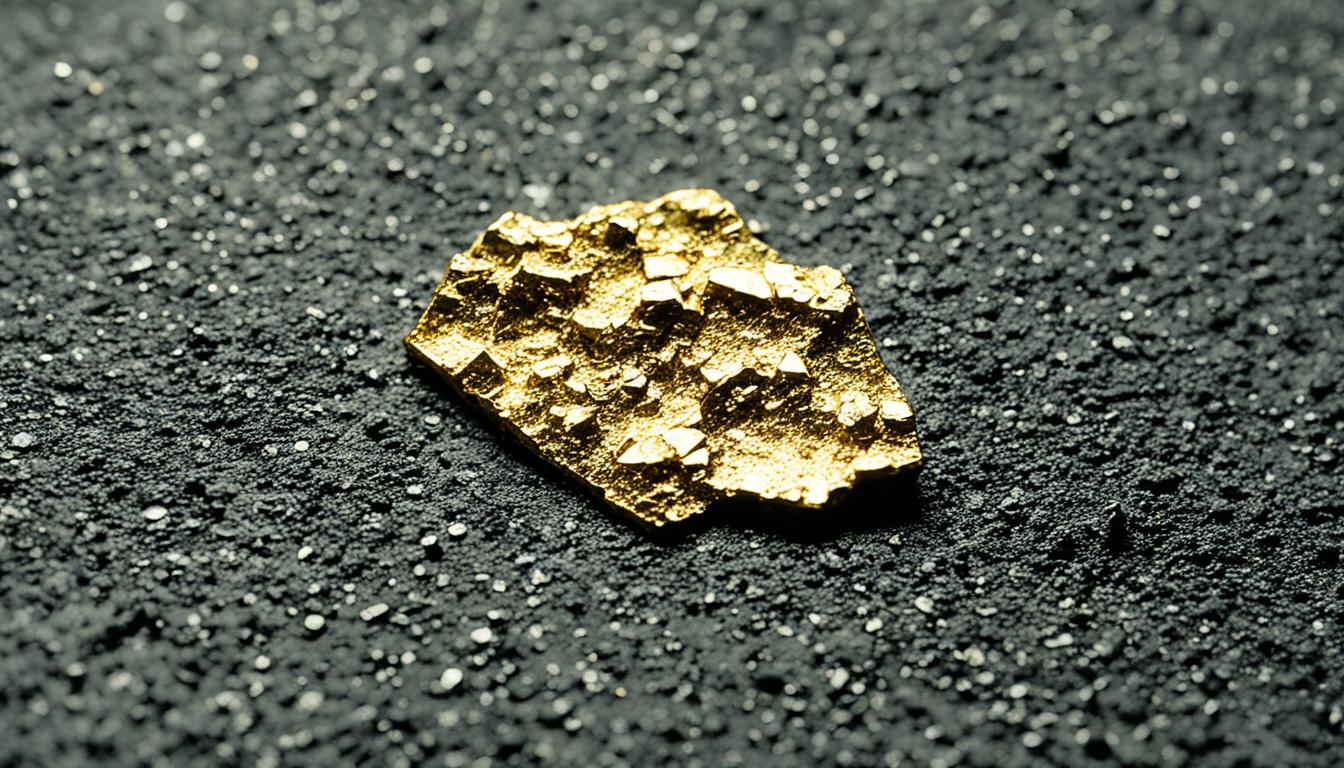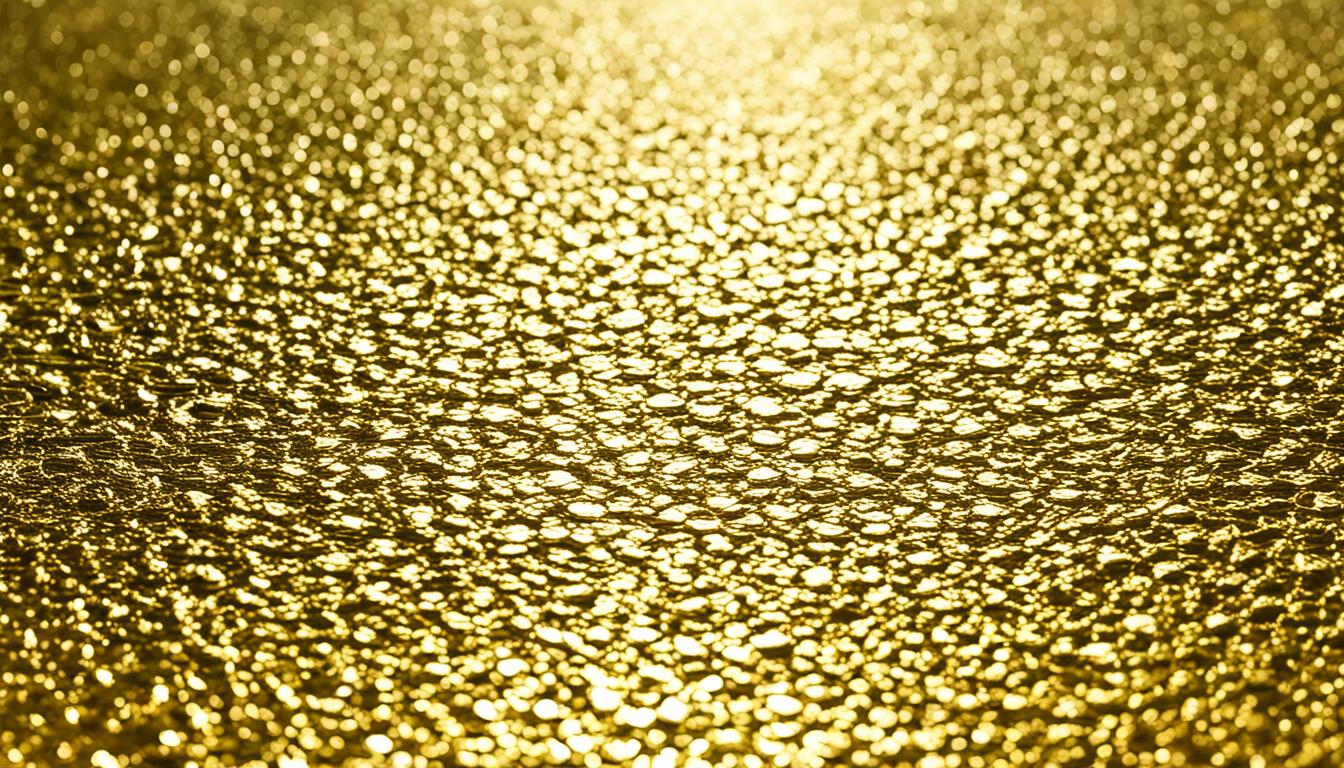Just 1% of the world’s gold has been recycled. This shows how durable and resistant to rust this metal is. Let’s explore the enduring value of gold and how it stays shiny. We’ll also look at why it’s a key part of things like electronics and healthcare.
Gold is known for its beautiful shine and high worth. Many wonder if it can really rust or lose its shine. We will look into how gold can change over time and what affects its ability to stay looking new. We’ll also share tips on keeping your gold items sparkling.
Introduction to Metal Corrosion
Metal corrosion is natural. It happens when metals react with their surroundings. This leads to the breakdown of their features. The process, known as metal oxidation, is key in learning about how corrosive metals work. Also, it teaches us how rust and tarnishing form.
Understanding Rust and Tarnishing
The most famous case of metal corrosion is rusting iron. It happens when iron meets oxygen and moisture. This creates iron oxide, or what we call rust. Rust can make metal parts weaker. This is a big worry in many fields.
Metals Susceptible to Corrosion
Iron is very prone to corrosion. But, there are many other metals that rust or tarnish. For example, copper gets a green or blue coat called verdigris. Silver can tarnish, too, from sulfur compounds. It’s important to know about each metal’s features. This helps pick the right ones for jobs and keep them in good shape.
The Unique Properties of Gold
People often wonder if gold can rust or tarnish. A change in color might make someone question whether their gold bullion or old jewelry is real. Pure gold is a noble metal, meaning it doesn’t react easily with other substances. This lack of reaction means pure gold does not rust or tarnish.
Gold’s Resistance to Oxidation
Pure gold doesn’t easily combine with oxygen. This prevents it from forming the tarnish or rust we often see on other metals. Its unique nature keeps pure gold looking shiny and new over time.
Purity and Alloy Composition
The more pure gold is, the less likely it is to tarnish or corrode. Gold alloys, made by mixing gold with other metals, might show signs of rust or change colors. But items made of pure gold, like gold bars and gold coins, are very resistant to corrosion. They keep looking bright and beautiful.
does gold rust
Gold is a noble metal, known for being resistant to most forms of damage. Yet, when it’s combined with other metals, like copper or silver, it’s not the same. These combinations, known as gold alloys, can react differently when exposed to certain conditions.
Factors Affecting Gold’s Corrosion Resistance
The more pure gold is, the less likely it is to corrode. Despite this, gold alloys, which mix gold with metals like copper or silver, are more prone to rust and tarnish. That’s why jewelry made of pure gold (24-karat) can last a long time without losing its beauty, unlike lower-karat gold alloys.
Exposure to air, moisture, and some chemicals can urge gold to corrode or tarnish. Keeping gold items in proper conditions is key. This helps to avoid the question, “does pure gold rust”, and maintain their shine for years to come.
Pure Gold vs. Gold Alloys
Compared to gold alloys, pure gold is king when it comes to staying untarnished. It’s almost impervious to rust. Gold alloys, having mixtures of gold with other metals, can rust or darken more easily.
In general, the purer the gold, the more resistant it is to damage. This is important to remember when choosing gold jewelry. 
Rust and Tarnish in Gold Bars and Coins
Gold bars and gold coins can sometimes show signs of rust and tarnish. Even though pure gold is very resistant, a mix of impurities or not storing them well can cause problems.
Most gold bars are safe from rust. But, they might rust if they get wet or are near chemicals. To keep gold coins shiny, it’s important to store them properly.
People who own gold bars and gold coins need to keep them in a safe place. This means protecting them from things that could damage their looks. With the right care, their golden treasures can stay in great shape for a long time.
Preventing and Cleaning Tarnished Gold Jewelry
Gold jewelry is both an investment and a fashion choice. Keeping its shine is key. Pure gold doesn’t easily tarnish, but gold mixtures in jewelry might. This is especially true for those with less gold in them.
To keep your gold looking great, store it right. Keep it in a cool, dry spot. Stay away from damp places and direct sun. Also, use air-tight containers or soft pouches. This stops air and pollutants from causing tarnish.
Avoiding Harsh Chemicals
When cleaning gold, don’t use harsh chemicals or scrub it hard. Use gentle cleaners made for gold. Toothpaste or baking soda can scratch it. Special gold cleaning solutions are best. They are gentle and safe for your jewelry.
Regular Cleaning Methods
Cleaning your gold regularly is important. Use a soft, oil-free cloth or a gentle soap. Or, try a solution made for cleaning gold. Always check the label for how to use it. Don’t soak the jewelry for too long.
By following these steps for storing and cleaning gold jewelry, you’ll keep it beautiful. This care will also help keep its value over time.
The Role of Protective Coatings
Not all gold is resistant to rust, especially gold alloys which can tarnish. To keep your gold items shiny, it’s important to store and clean them well. Using gold protective coatings like lacquers and sealants, along with gold plating, can help. This approach provides extra protection against damage.
Lacquers and Sealants
Protective lacquers and sealants are great for preventing gold items from tarnishing. They form a clear layer over the gold. This layer protects against rust and keeps your gold looking new. Proper care of these coatings will keep your gold jewelry and coins shiny.
Gold Plating and Corrosion Resistance
Gold plating makes gold-based items more resistant to damage. It involves covering a metal like silver or copper with a thin layer of pure gold. This gold plating corrosion resistance stops oxidation. So, your gold-plated items will stay beautiful for a long time.

Taking good care of your gold and using protective measures ensures they remain valuable. These coatings and platings help your gold last longer. This means your gold items will be treasures for generations.
Industrial Applications of Corrosion-Resistant Gold
Gold stands out in many industries because it resists corrosion so well. Its unique abilities are used in electronics, aerospace, and even in medical and dental fields. Thanks to gold, these products stay protected from harmful corrosion effects.
Electronics and Aerospace Industries
Gold is key in electronics for protecting circuit boards and connectors. It fights off rust and keeps electricity flowing consistently. This means your devices work well for a long time.
In aerospace, components with a layer of gold are hard to find but crucial. They can survive high temperatures, strong vibrations, and corrosion.
Medical and Dental Implants
Doctors and dentists prefer gold for its safe touch in our bodies. It doesn’t let out bad chemicals, reducing the chance of any bad effects. This is super important for things like dental crowns and medical implants. They need safe, long-lasting materials.
Gold’s power to resist corrosion supports many products we rely on. With gold, these items last longer, work better, and stay safe, even in tough conditions. So, industries keep using gold to make top-notch products.
Preserving the Value of Gold Investments
Many have found investing in gold to be a smart choice over time. It’s a way to keep your wealth safe and make your investments varied. But, keeping the preserving gold value of these investments is key. Taking care of your gold the right way helps it stay valuable and shiny for a long time.
Maintenance and Care
To preserve gold value, clean and store it well. Use a soft cloth to wipe dust or fingerprints off gold bars or coins. Don’t use tough chemicals or anything abrasive on them, as this could harm their surface.
Keep gold in a dry, cool area to stop it from getting gold tarnish. Stay clear of direct sunlight and places with lots of moisture.
Gold jewelry needs special attention too; it has its own gold alloy composition. Follow what the maker suggests for cleaning and storage. You might use an ultrasonic cleaner or wash it gently with soap and water. To avoid scratches and too much air or moisture, store your jewelry in a soft box or pouch.
Consulting Experts
Getting advice from gold experts can help a lot with gold investment maintenance. Talk to financial advisors, people who sell precious metals, or those who collect gold. They often have good tips on keeping your gold safe and in top condition.
Taking the time to look after your gold really pays off. With the right care, your investments can keep their value. They’ll also play a big role in your plans for managing your wealth.
Conclusion
Pure gold doesn’t rust, but other metals can easily corrode. It’s vital to know gold’s unique qualities. This knowledge helps in wise project, investment, and possession choices. To fight rust in metals, try regular care, use protective coatings, and store them right.
Know how metals react in different environments is crucial for anyone interested in jewelry, DIY projects, or working with metals. Keeping informed and taking care of your metals can protect your investments. This way, your gold and other precious metals will stay beautiful for a long time.
With gold, remember it doesn’t easily tarnish. Yet, other metals might. By learning about this, you can protect your metals well. This ensures they keep shining through the years.




